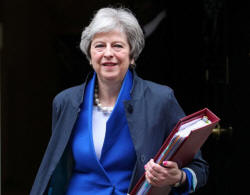Pro-Brexit lawmakers pressure British PM May over
customs plan
 Send a link to a friend
Send a link to a friend
 [May 02, 2018]
By Elizabeth Piper [May 02, 2018]
By Elizabeth Piper
LONDON (Reuters) - Pro-Brexit lawmakers
heaped pressure on British Prime Minister Theresa May on Wednesday over
her future customs plans with the European Union, calling on her to drop
what some say is her preferred proposal.
May's decision to leave the EU's customs union, which sets tariffs for
goods imported into the bloc, has become one of the main flashpoints in
the Brexit debate in Britain, pitting companies and pro-EU campaigners
against a vocal group of hardline euro skeptic lawmakers.
With the added pressure of trying to prevent the return of a "hard"
border in Ireland and find something Brussels might agree to, May has
delayed putting any firm plans for future customs arrangements on the
table, hoping to plot a route that could at least please more than one
side.

Just hours before May was due to meet her so-called Brexit war cabinet
of 11 ministers, the pro-Brexit lawmakers called on her to drop one of
her proposals which would see Britain essentially act as the EU's tariff
collector.
Members of the European Research Group, a group of Brexit lawmakers in
May's Conservative Party, said they were not issuing her an ultimatum
with their demands, rather presenting their argument that such a customs
partnership would not work.
"It is more of a statement of our position, with supporting arguments,"
a member of the ERG said.
May is not only under pressure at home. She also faces increasingly
urgent demands from Brussels to come up with a customs plan to avoid a
return to a hard border between British-ruled Northern Ireland and the
Irish Republic. There are fears that reintroducing checks on what will
be Britain's only land border with the EU could reignite sectarian
violence.
After losing her party's majority at an ill-judged election last year,
May has put off committing to a single plan, offering Brussels two
options -- the customs partnership or a technology-based streamlined
customs arrangement, both of which EU negotiators have dismissed.
[to top of second column] |

Britain's Prime Minister Theresa May walks out of 10 Downing Street
in London, Britain, May 2, 2018. REUTERS/Hannah McKay

The easiest way to solve the problem, May's critics say, is to stay in the
customs union or negotiate a new one along the lines proposed by the main
opposition Labour Party.
Her spokesman said earlier this week the government would "move forward with a
single option", but the question is when?
On Monday, her minister for the cabinet office, David Lidington, said it would
most probably take a few weeks to decide on a final position, playing down any
expectations of a quick decision at Wednesday's meeting of the Brexit committee.
Brexit campaigners are hoping that the appointment of free-market advocate Sajid
Javid as Home Secretary this week could shift the balance in their favor on the
sub-committee.
But by leaving the question open May has been vulnerable to attempts both in the
upper and lower houses of parliament to try to force the customs union back onto
the agenda.
Her government was defeated in the House of Lords earlier this week, and has
postponed votes in the House of Commons after several lawmakers in her party
said they would support attempts to draw a commitment to stay in the customs
union.

(Additional reporting by Alistair Smout and Andrew MacAskill; editing by David
Stamp)
[© 2018 Thomson Reuters. All rights
reserved.] Copyright 2018 Reuters. All rights reserved. This material may not be published,
broadcast, rewritten or redistributed.
Thompson Reuters is solely responsible for this content. |